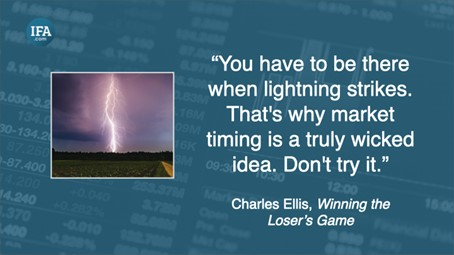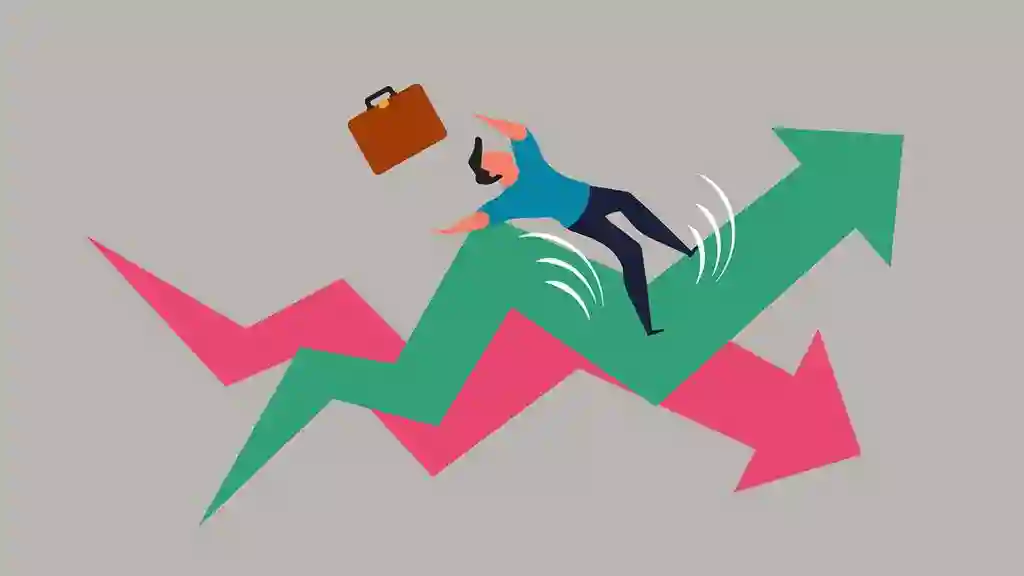You've probably heard in the news that the global financial markets have been rather volatile in recent days.
It started in mid-July. We never can be sure what the precise reasons behind these episodes are, but mixed economic data, expectations of interest rate changes, and concerns surrounding the upcoming Presidential election all undoubtedly played a part.
Then, on Friday, August 2nd, the Bureau of Labor Statistics released its jobs report for July, which showed that unemployment has risen to 4.3%, the highest it has been since October 2021. That stoked concerns that the economy may be heading for recession, causing stock prices to fall sharply — not just in the US but around the world.
Market falls can be very unsettling. Psychologists have identified a common behavioural bias called loss aversion, which means the pain of losing money is more impactful than the pleasure of gaining the same amount. Volatility can be particularly unnerving for those who have either just retired or are about to retire, especially if they're worried about having to change their plans should markets fall further.
There's No Escaping Uncertainty
The crucial thing to remember at times like these is that there will always be uncertainty in the financial markets. For investors, it goes with the territory. In fact, if we didn't have uncertainty, we couldn't expect a premium for investing in stocks at all.
The good news is that markets have historically rewarded patient investors. Just think about some of the events that have rattled the markets in recent years — the global pandemic, the Russian invasion of Ukraine, spiking inflation and so on. Each time the outlook appeared bleak, but the markets recovered and went on to reach new heights.
Here at IFA, we have no special insight into where the markets are heading. The recent market turbulence could be the start of a full-on crash and perhaps even a long bear market. Or it may just blow over and be all but forgotten in a few weeks' time. The point is, we don't know. Nobody does. So the rational strategy is keep your emotions in check, stay invested and focus on your long-term goals.
The problem is, human beings have an inbuilt bias towards action. When the unexpected happens, investors often feel they should be doing something, if only to relieve any emotional discomfort they may be feeling. But if, for example, you reduce your equity exposure after markets have already fallen, you're simply crystallizing losses.
Timing The Market Is Extremely Challenging
Selling stocks after market falls is a classic example of what's called market timing. Research shows us, time and again, that it's almost impossible to time the market correctly with any consistency. It's especially difficult during market turbulence.
Just look at Japanese stocks in the last few days, for instance. The Nikkei 225 index fell 20% in three sessions. The fall of 4,451 points on Monday August 5th was the biggest one-day points fall since the Black Monday crash of 1987. What happened next? The market went back up by more than 12% in the next two sessions.
As Charles Ellis wrote in the latest edition of his well-known investing book Winning the Loser's Game, "You have to be there when lightning strikes. That's why market timing is a truly wicked idea. Don't try it."

The crucial point is, if you get out of the market on the worst days, you're in grave danger of missing out on the best days. Why? Because the best days tend to come very soon after the worst days.
To see how big an impact not being invested on the best days can have, just look at the chart below. The chart is based on 20 years of data and shows the impact of missing the best days on the total returns of a $10,000 investment in the IFA SP 500 Index (which tracks S&P 500) between January 1, 2004 and December 31, 2023.
An investor who stayed fully invested over the entire period would have seen the value of their investment grow more than sixfold to $63,475. If, however, an investor had missed the ten best days in the market, that would have more than halved the size of their end portfolio. An investor who missed 40 of the best days would have a loss of 1.17% annualized return compared to a 9.68% annualized return if they had only stayed invested!
Zoom Out And See The Bigger Picture
In short, when markets wobble like they have done recently, try to focus on the bigger picture. Markets rise and fall: they always have and always will. But the long-term trajectory is upwards.
Nobody knows if we're about to enter a recession. Even if we are, it's by no means a disastrous scenario for investors. For one thing, markets tend to fall in advance of a recession, so they have already factored in the possibility that there will indeed be one. Also, in the past, markets have generally performed well in the years immediately after a recession.
So stay invested. Stay diversified too, because that way, whatever the future holds, you'll reduce the potential pain caused by the poor performance of a single company, industry or country. And if you don't already have a financial plan, get in touch and let's start building one for you.
Whatever you do, though, don't even think about trying to time the market. It's just not worth it.
For more information on market, you may find the following articles of interest:
Three compelling reasons to avoid market timing
What 60 years on Wall Street taught Benjamin Graham
For more detailed analysis, you should read Step 4 of Mark Hebner's book, Index Funds: The 12-Step Recovery Program for Active Investors.
Robin Powell is the Creative Director at Index Fund Advisors (IFA). He is also a financial journalist and the editor of The Evidence-Based Investor. This article reflects IFA's investment philosophy and is intended for informational purposes only.
This article is intended for informational purposes only and reflects the perspective of Index Fund Advisors (IFA), with which the author is affiliated. It should not be interpreted as an offer, solicitation, recommendation, or endorsement of any specific security, product, or service. Readers are encouraged to consult with a qualified Investment Advisor for personalized guidance. Please note that there are no guarantees that any investment strategies will be successful, and all investing involves risks, including the potential loss of principal. Quotes and images included are for illustrative purposes only and should not be considered as endorsements, recommendations, or guarantees of any particular financial product, service, or advisor. IFA does not endorse or guarantee the accuracy of third-party content. For additional information about Index Fund Advisors, Inc., please review our brochure at https://www.adviserinfo.sec.gov/ or visit our website at www.ifa.com.














